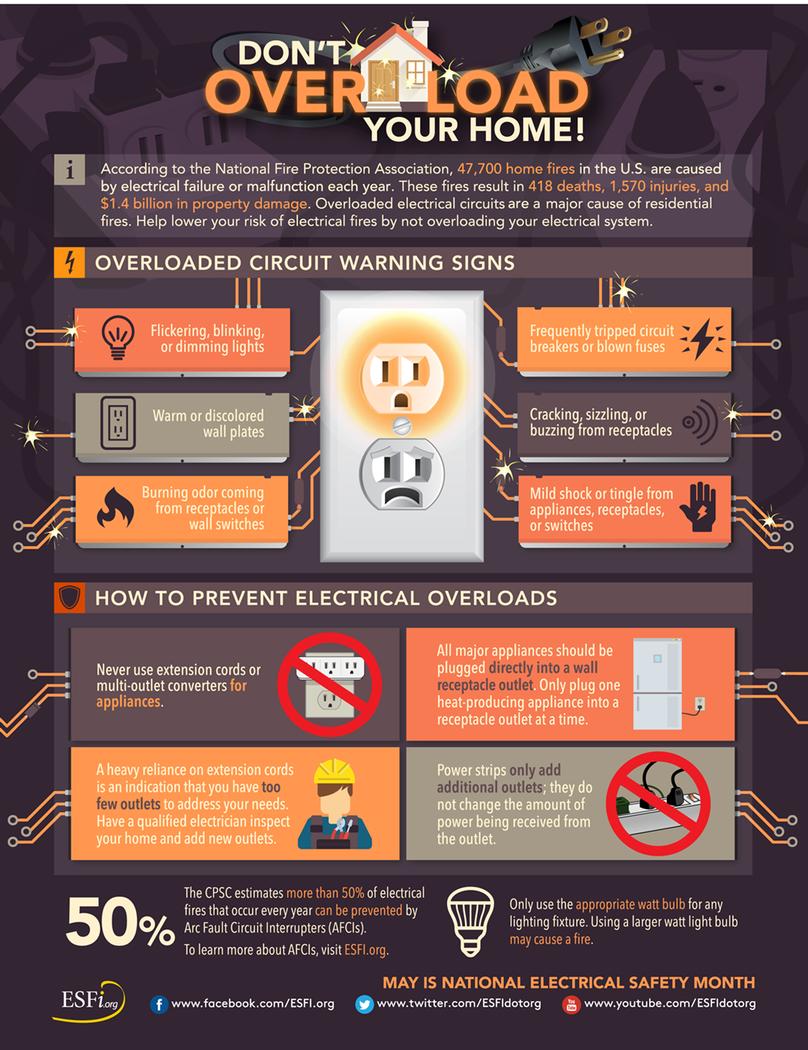Electrical issues were the second leading cause of home fires between 2012 and 2016, according to the National Fire Protection Association -- and there's little evidence that the trend has changed. Not only are they common, but electrical fires contribute to disproportionate rates of deaths and serious property damage.
In short, when proper precautions are not in place, fires that result from electrical malfunctions or accidents can be seriously dangerous. Luckily, these electrical safety tips can help keep you, your loved ones and your belongings safe. Let's take a look at how electrical safety impacts inspecting appliances, selecting and checking the devices used in your circuits and various approaches to fixing problems at home.
Keep the power off during inspections or installations
This is one of the simplest rules of electrical safety in the house: when you want to inspect an appliance or replace one, make sure the circuit is off for that plug. Many breakers designate an area where large appliances are in your home. Along with switching off the circuit, unplug the appliance as you inspect it. Doing so ensures that you do not receive a shock.
Limit electrical output
Kitchens often have more circuits, specifically to deal with the heavier load required by large and countertop appliances -- but the same isn't true in other parts of the house. To keep electrical output from stressing your circuits, avoid plugging more than one heated appliance (hair straightener, toaster, etc.) into a single circuit at a time.
Larger appliances, like a toaster oven, oven or microwave should also be plugged directly into an outlet, rather than into an extension cord or outlet extender. These extenders often add more resistance to the flow of electricity, forcing the appliance to draw more current from the circuit. This creates the conditions for a fire due to overheating or a short.

Check your cords
If you notice any fraying, torn or exposed wiring, shut off power to it through the circuit breaker. If the cord is for a small device, consider replacing it. If it's for a larger appliance, contact the manufacturer for tips on how to replace the cord. If it's under warranty, they might do this for you.
Adhere to manufacturer recommendations for lighting
This might seem straightforward, but we often neglect to do it: When you buy a lamp or other lighting device, it comes with the maximum wattage recommended for bulbs. Make sure you don't exceed this, as it can overheat the bulb.
Another precaution is to use a globe or shade to cover exposed bulbs. Bulbs can run hot, and covering them prevents nearby items from coming into contact with them, causing a fire risk.
Know where your electrical lines are
For homeowners cleaning their gutters or trimming trees, don't put your ladder anywhere near overhead electrical cords if your house has them. Likewise, if you need to dig and have underground power cables, contact your utility company first. They offer location services to mark your power lines, so you do not strike them when digging.
Your tripping circuit breakers could be a warning sign
Does your circuit breaker trip repeatedly when you're doing something like starting your washing machine or plugging in a power cord? It could signal an overloaded circuit breaker. It will trip it if it is trying to receive more power than its carrying capacity. If you notice this happening, consult with an electrician.
Read more: Winter safety checklist
Consider installing arc-fault circuit interrupters in older homes
Older homes sometimes do not have the energy capacity to handle the demands of today's technology. Because of this, it could make them more susceptible to fires due to overloading circuits. One way to keep your home safe is to install arc-fault circuit interrupters.
They work by sensing different arcing conditions (when electricity jumps from one wire to another, sometimes burning material between them). When you flip on a light switch or plug your laptop charger, it identifies these as regular arcing events. However, if it determines the situation is hazardous, it cuts power to prevent a fire from starting.
Consider installing ground-fault circuit interrupters
Ground-fault circuit interrupters sense the current going to and from a device plugged into the wall, and basically shut down the power source if that current goes out of whack (indicating a shock, for instance). These can be installed in bathrooms, kitchen, basement, laundry, garage and outdoor plugs.
When in doubt, contact an electrician
Do not attempt to handle any electrical problem by yourself if you are not an electrician. Additionally, consider having an electrician inspect your home before a remodel or if the house is 40 years or older. Doing so gives you peace of mind, and can prevent problems by addressing their causes before they happen.
Conclusion
Electricity is an integral part of our lives. From keeping the lights on to powering our cooking and cleaning appliances, it serves many purposes in our homes. With a high reliance on electricity, it's important to enact electrical safety measures to prevent risk. Following the tips above -- and calling an electrician if you're ever in doubt -- will help minimize the risk of electrical fires and other accidents.








